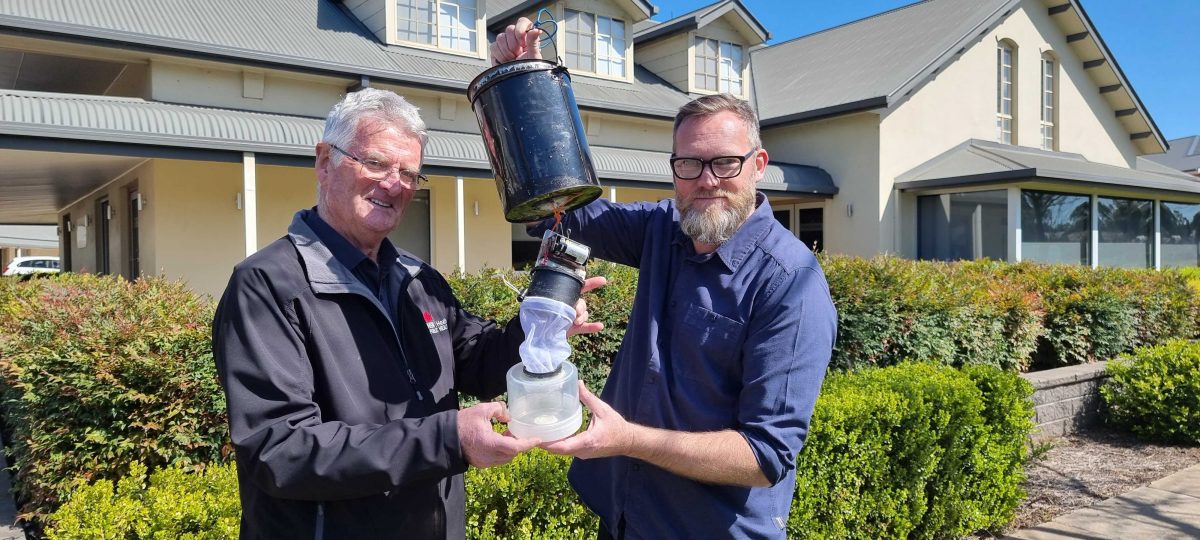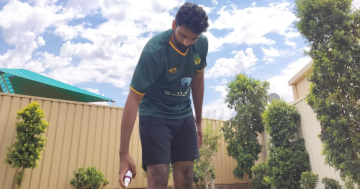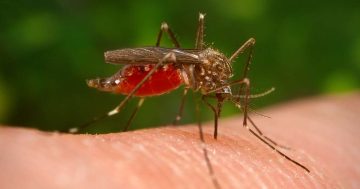
Murrumbidgee Local Health District senior environmental health officer Tony Burns and University of Sydney clinical Associate Professor and medical entomologist Cameron Webb presented a mosquito trap they use to monitor the prevalence of the insects in the region. Photo: Shri Gayathirie Rajen.
One of the most commonly suggested foods to eat to avoid mosquito bites is … irrelevant, according to Cameron Webb.
The University of Sydney clinical associate professor and medical entomologist said: “there’s nothing that you can eat or drink that will stop mosquitoes biting you.”
He said some people get bitten more by mosquitoes than others because of the smell of their skin.
“If you’ve got a cocktail of smells that mosquitoes like more than your friends and family, unfortunately, you’re the one who’s going to get bitten,” Professor Webb said.
“When the mosquitoes are trying to bite or find someone to bite, they are sensing the body heat, the carbon dioxide you breathe out and the smell of your skin produced by bacteria and chemicals on your skin.”
He said even changing the deodorant or the colour of the clothing will not stop the mossies from using their needle-like fangs to pierce the skin and suck the blood – the only effective solution is putting on repellent.
He advises people to put a nice even coat of repellent on the skin, particularly at dawn and dusk when the mosquitoes are most active.
“Put on the repellent to stop all mosquitoes biting, not just those transmitting viruses [like Japanese encephalitis (JE)].
With the region’s La Nina spring and summer ahead, the mosquitoes are set to have great breeding conditions.
Murrumbidgee Local Health District senior environmental health officer Tony Burns said upcoming wet conditions would be conducive to high mosquito numbers.
He said the rise in the Murrumbidgee River and rains have already created ideal breeding conditions for the mosquitoes.
Mr Burns said the early warning surveillance system helped identify various dangerous mosquito viruses such as JE.
“We’re taking additional precautions to ensure with the early surveillance … we’ll be able to get the message out,” Mr Burns said.
“We’ve had a number of [JE] cases across the district and state, but it was only over a short period of time.”
Professor Webb said there are thousands of different types of mosquitoes worldwide and hundreds even in this part of NSW.
“But there’s really only a handful that pose a significant nuisance biting or disease risk,” Professor Webb said.
“And the mosquito of greatest concern is a species called Culex which is found in freshwater environments, flooded areas, wetlands on the sides of rivers.
Australian mosquitoes can carry a range of viruses for which there are no vaccines, so it is vital to avoid mosquito bites. Protect yourself and your family by:
- covering openings such as windows and doors with insect screens and checking there are no gaps in them
- removing items that might collect water (such as old tyres, empty pots) outside your house where mosquitoes can breed
- improving drainage on your property so that water does not become stagnant
- wearing light, loose-fitting long-sleeved shirts, long pants and covered footwear and socks, especially around dusk and dawn
- applying repellent to all areas of exposed skin, using repellents that contain DEET, picaridin, or oil of lemon eucalyptus
- re-applying repellent regularly, particularly after swimming, being sure to always apply sunscreen first and then repellent
- using insecticide sprays, vapour dispensing units and mosquito coils to repel mosquitoes (mosquito coils should only be used outside).
Representatives from NSW Health, local councils, National Parks, Department Primary Industries and Local Land Services gathered in Wagga this week to learn more about mosquitoes in preparation for the upcoming breeding season.
Detection of Japanese encephalitis in NSW will see an expansion of surveillance programs this summer, and an increased focus on bite prevention.










